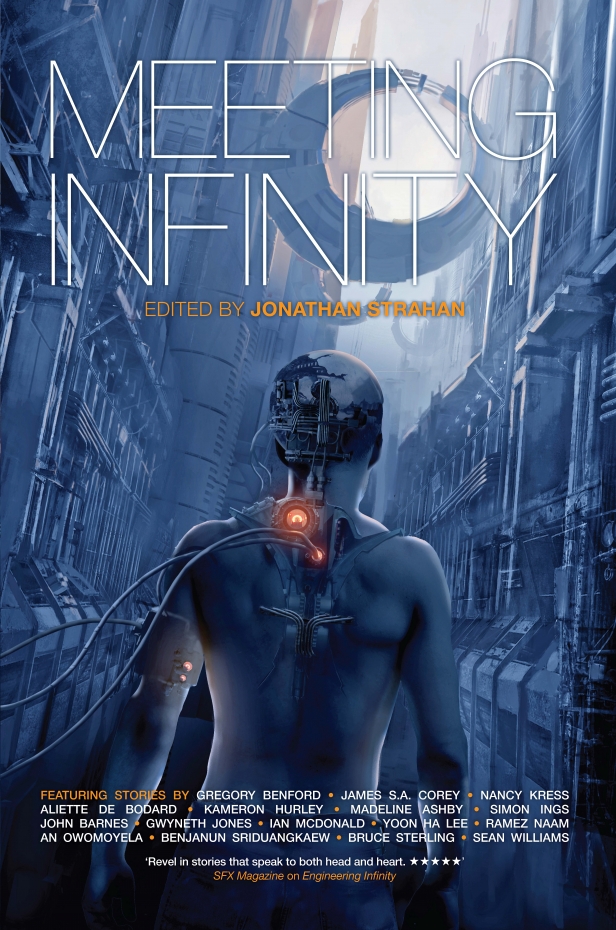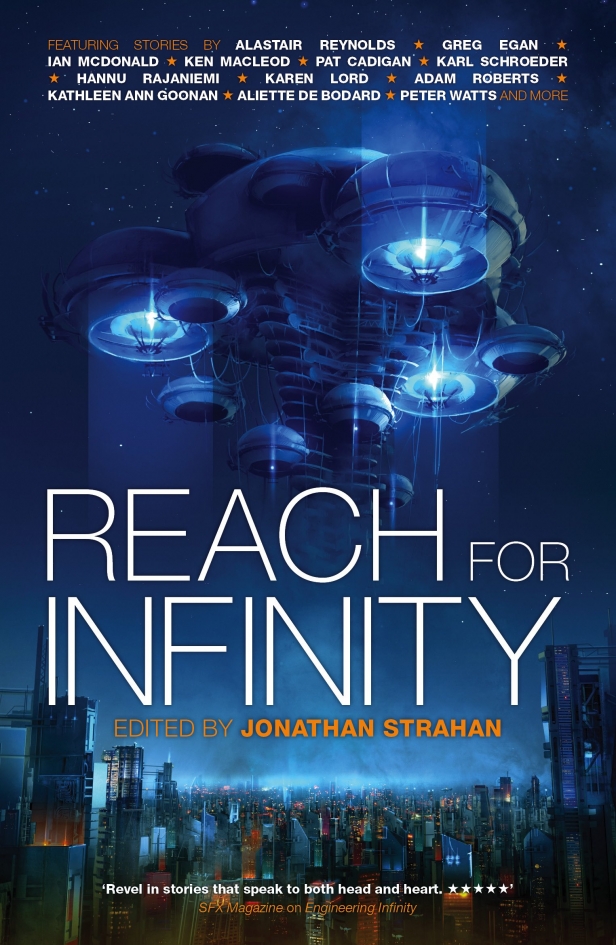Meeting Infinity, the new sci-fi anthology collection edited by Jonathan Strahan, is available now and features an incredible selection of authors.
The line-up for the latest in Strahan’s Infinity series includes Madeline Ashby, John Barnes, James SA Corey, Aliette De Bodard, Kameron Hurley, Simon Ings, Gwyneth Jones, Nancy Kress, Yoon Ha Lee, Ian McDonald, Ramez Naam, An Owomoyela, Benjamin Sriduangkaew, Bruce Sterling and Sean Williams. We did say the line-up was incredible.
In his introduction, Strahan explains that he asked the authors to “think about the ways in which profound change might impact on us in the future, how humanity might have to change physically and psychologically, to meet the challenges that may be thrown at us in the next fifty, the next hundred, and the next five hundred years and beyond.”
We spoke to him about how these writers responded, the evolution of the Infinity series, and the very exciting state of modern science-fiction.
How would you describe the Infinity series to a newcomer?
Classic science fiction remade for the 21st Century. The Infinity Project books take classic science fictional ideas and themes and updates them, brings contemporary science and thought to them, while always being entertaining and engaging. The series also looks to present a combination of great established writers and exciting new voices so that readers can both find stories from writers they love and discover new writers they may not yet have encountered.
Have you been surprised by how the Infinity anthologies have evolved?
Definitely. This Infinity Project began as a single book, a one-shot called Engineering Infinity, which was supposed to provide a survey of contemporary hard SF. When readers responded to that book, we look began to discuss what we could do next. Edge of Infinity, in some ways the most successful in the series so far, began to actually give the series structure and character. I certainly didn’t expect it would link up with Reach for Infinity the way it did.
What hasn’t surprised me, though, is how readers have responded to the series. Readers love classic or core science fiction as much as they or more than they love experimental or genre-blurring fiction. The Infinity Project has given readers a reliable place to look for core SF, which they seem to appreciate.
What was the process for finding these authors for Meeting Infinity?
I spend a lot of my year reading short fiction and taking notes for The Best Science Fiction and Fantasy of the Year, and I’m constantly thinking how the writers I encounter could fit into possible books. For Meeting Infinity I made a long list of writers who had either written classic stories that fitted the theme of the book – Bruce Sterling, Gregory Benford, Nancy Kress – or who had written work that I thought fit well with it. I then contacted many of them, and asked them to write for the book. There were one or two surprises along the way, but in the end I think they delivered a terrific range of stories, all of which address the central idea of how we have to adapt ourselves to fit into the futures we might encounter in interesting and diverse ways.
You talk in your introduction about asking the authors to think about how we might react to a profound change, did you find they were relatively optimistic?
I think they were really engaged with the idea of reacting to profound change in the future, and that they delivered terrific, engaging stories. Some of them are definitely optimistic – you can see that in the backgrounds and settings of the stories they tell – and some of them are less so. There’s a lot of discussion about optimistic versus pessimistic stories in science fiction and I’m not sure how useful that is. Writers are looking to create drama and tension in a story so that they can draw readers in, and sometimes that can look pessimistic, but it often isn’t. Writing about the future seems an inherently optimistic thing to do to me.
There’s an incredible bunch of writers in this collection, do you think sci-fi is in a healthy place at the moment?
I really do. When you talk to people who work in and around book and magazine publishing they often sound pessimistic because there are a lot challenges facing the business of science fiction at the moment, but the creative side is in incredible shape. The growing number of venues out there means writers really are able to get their work out to readers. That encourages more and more people to be creatively involved, and that means more great writers and stories.
The most exciting thing at the moment, I think, is the increased involvement of writers from beyond the US and UK in the science fiction we’re seeing. There’s a lot of fiction in translation coming from China and parts of Asia, more fiction from Europe, and a lot more from Africa. That is incredibly exciting. With the quantity and diversity of science fiction being published, there really is something to satisfy any reader. And in terms of the health of the genre, diversity of authors has always been important. They bring in new points of view, new approaches to telling stories. I’m very optimistic about SF and the coming decade.
Do you think it’s important that science fiction addresses issues that we’re facing?
It’s critical that science fiction addresses the issues we’re facing for its own health. An enormous part of science fiction is and always will be about pure entertainment: tales of adventure set against awe-inspiring backdrops are the stuff of classic science fiction (which I love). But what has always given SF its edge is when we engage with the world and issues around us and attempt to discuss them intelligently. Science fiction gives writers a palette to discuss issues like global warming and climate change, imperialism, or whatever in really interesting and powerful ways. You see this in classic work from the 60s and 70s like John Brunner’ Stand on Zanzibar and Le Guin’s The Dispossessed, in the 80s in Gibson’s Neuromancer and Sterling’s Islands in the Net, and in just about anything written by Kim Stanley Robinson. And it’s not that science fiction is offering solutions to issues, it’s that it offers a space in which they can be discussed.
What is your favourite part of putting an anthology together?
I love the moment when a new story hits my inbox and there’s the possibility that it could be the greatest thing I’ve ever read and could surprise me completely, but my very favourite moment comes about two weeks or so after I’ve delivered the manuscript to the publisher. It stops being something I’m working on and becomes a book, it’s own thing. I start to get feedback on it, to get it reflected back to me through they eyes of my own editor and copyeditor and the eyes of reviewers, and I get to see the book they see rather than the book I was working on. I love that.
Are there any authors that you’re particularly excited by when you see they’ve got something new coming out?
Any editor is a reader first, so I’m always excited when writers have new books coming out. I’m especially excited when I hear about new books coming out favourites like Guy Gavriel Kay, Bruce Sterling, Lois McMaster Bujold, or Kelly Link, but I love discovering new writers and new books. 2015 added a whole bunch of new people to that list, like Natasha Pulley, Zen Cho, Sam Miller, Kelly Robson, and Dave Hutchinson. I’m sure 2016 will add a whole bunch more!
Meeting Infinity is out now from Solaris and you can buy it for £9.94 at Amazon.co.uk. Keep up with the latest genre news with the new issue of SciFiNow.

